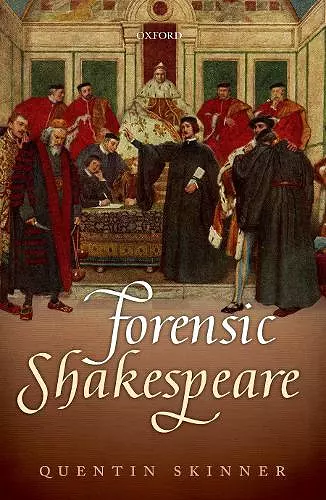Forensic Shakespeare
Format:Paperback
Publisher:Oxford University Press
Published:1st Feb '18
Currently unavailable, and unfortunately no date known when it will be back
This paperback is available in another edition too:
- Hardback£20.99(9780199558247)

Forensic Shakespeare illustrates Shakespeare's creative processes by revealing the intellectual materials out of which some of his most famous works were composed. Focusing on the narrative poem Lucrece, on four of his late Elizabethan plays (Romeo and Juliet, The Merchant of Venice, Julius Caesar and Hamlet) and on three early Jacobean dramas, (Othello, Measure for Measure and All's Well That Ends Well), Quentin Skinner argues that major speeches, and sometimes sequences of scenes, are crafted according to a set of rhetorical precepts about how to develop a persuasive judicial case, either in accusation or defence. Some of these works have traditionally been grouped together as 'problem plays', but here Skinner offers a different explanation for their frequent similarities of tone. There have been many studies of Shakespeare's rhetoric, but they have generally concentrated on his wordplay and use of figures and tropes. By contrast, this study concentrates on Shakespeare's use of judicial rhetoric as a method of argument. By approaching the plays from this perspective, Skinner is able to account for some distinctive features of Shakespeare's vocabulary, and also help to explain why certain scenes follow a recurrent pattern and arrangement. More broadly, he is able to illustrate the extent of Shakespeare's engagement with an entire tradition of classical and Renaissance humanist thought.
Forensic Shakespeare has all the qualities of erudition and lucidity one would expect from Quentin Skinner. * Neil Rhodes, Around the Globe *
This generous, helpful guide goes a long way towards explaining how Shakespeare's literary genius works. * Andrew Hadfield, Irish Times *
A magisterial, loving study of Shakespeare's infinitely varied use of the handbooks of judicial rhetoric shaping the thought of any Elizabethan (and us too, come to that). * Fred Inglis, Books of the year 2014, Times Higher Education *
a brilliant study of the teachings of classical legal rhetoric as used and misused by Shakespeare's speakers. * Brian Vickers, Book of the Year 2014, Times Literary Supplement *
clear and convincing ... It's doubly impressive to imagine the book's own oratorical origins, since its later chapters now work so well as something so textual as an index of Shakespeare's uses of the five parts of a judicial speech. * Matthew Ritger, Los Angeles Review of Books *
exemplary scholarship. * David Womersley, Standpoint *
a genuinely illuminating book and should be required reading for every serious student of [Shakespeare]. * Brian Vickers, Common Knowledge *
explores the idea that the Bard skilfully employed judicial rhetoric in the poem Lucrece and in some half-dozen of his most famous plays. A good one for Lawyers, Law students and anyone keen to sprinkle their dinner party conversation with some judiciously selected pearls of Shakespearean legalese. * Shakespeare Magazine *
the book is at its best on rhetoric and there is nobody better informed or more articulate on the subject of classical rhetoric than Skinner ... Skinner presents very engaging and detailed accounts of how judicial rhetoric develops through vernacular translations into a comprehensive language of performance and persuasion. There is no doubt that one of the greatest gifts of this book is the attention to the rhetorical texts themselves and their vigourous and learned analysis. * Charlotte Scott, The Year's Contribution to Shakespeare Studies *
Skinner's book is a fascinating read, rich with instruction, analysis and suggestions for further study. * B. J. Sokol, Notes and Queries *
ISBN: 9780198816430
Dimensions: 233mm x 154mm x 19mm
Weight: 532g
368 pages